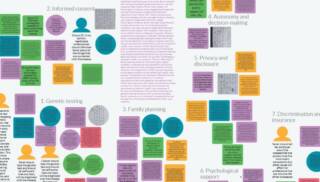On day one, the GenoNurse project welcomed everyone and included a lecture on the ethical aspects of genomic-informed nursing. Participating nursing students and teachers received background information on Huntington’s disease, as well as insights into the experiences of patients living with this disease.
 Following this, students were divided into international small groups to discuss ethical questions related to a brief case scenario involving Huntington’s disease. The student groups recorded their responses on the Flinga Wall.
Following this, students were divided into international small groups to discuss ethical questions related to a brief case scenario involving Huntington’s disease. The student groups recorded their responses on the Flinga Wall.
A few weeks later, on the second day, students were presented with two lectures. The first lecture was on research ethics. The second lecture was a presentation by a practicing midwife who shared about antenatal genetic testing and the role of ethics in this context.
The students were then divided into small groups to discuss two patient scenarios and think about questions around professional roles in ethical discussions with patients as well as what kind of support patients need, for example, when they are informed that their unborn child has a genetic condition. A particular emphasis was placed on justifying actions. The students produced their work in groups on Flinga Walls.
Students were eager to participate. We had over 170 participants on each day. At the end of both webinar sessions, we shared the results of what students had come up with in their groups. The ideas our students came up with demonstrated empathy towards patients, critical thinking, and a growing understanding of the challenging, yet necessary, role of ethics in genomics overall.
It was wonderful to witness students collaborating on international project and tackling even the most challenging subjects together.
Big thanks to everyone who joined the GenoNurse project webinar!

Comments